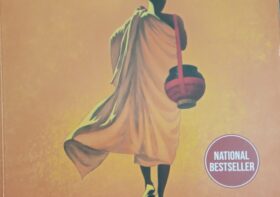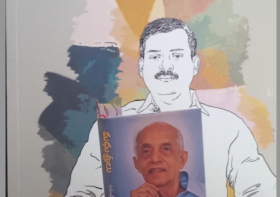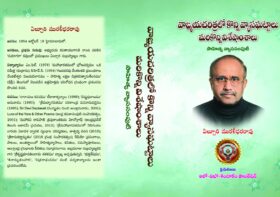Book Review: River of Gods
రాసిపంపిన వారు: Hrishikesh Barua
Hrishikesh Barua skroderider’s అన్న బ్లాగులో పుస్తకాల గురించి తరుచుగా రాస్తూ ఉంటారు. ఇదివరలో ఒకసారి హైదరాబాదులో పుస్తకాల కొనుగోళ్ళ గురించి పుస్తకం.నెట్ లో ఆంగ్లం లో రాసారు (ఇక్కడ). ఇప్పుడు మరోసారి, పుస్తకం కోసం – ఒక సైన్స్ ఫిక్షన్ నవలను పరిచయం చేస్తున్నారు. We thank Hrishikesh for responding almost instantly to write here. Hope to see more non-Telugu enthusiasts turning up soon.
– pustakam.net team.
***********************************************************
 India. 2047 AD. That’s where Ian McDonald‘s science fiction novel is set. It’s an India that is a balkanized version of the present. The Ganga is still sacred, only dirtier. The inevitable future technological gizmos are a part of life, and so is religion. Debt collecting robots are as ubiquitous as rogue AIs in factories.
India. 2047 AD. That’s where Ian McDonald‘s science fiction novel is set. It’s an India that is a balkanized version of the present. The Ganga is still sacred, only dirtier. The inevitable future technological gizmos are a part of life, and so is religion. Debt collecting robots are as ubiquitous as rogue AIs in factories.
Once you read the book you realize the amount of studying about present day India McDonald has done. He does a wonderful job of logically extrapolating today’s India 40 years from now. I’ll just focus on some of the major themes, instead of writing a precis of the whole book.
Note: There would be some spoilers below, so if you have not read the book and plan to do so, you can skip this review.
Names: These is not a theme of the book per se, but I could not help commenting on it. It’s something I usually look out for. More often than not, science fiction writers attempting to set their stories in India with Indian characters stumble badly when dealing with Indian names. They either come up with some really odd combinations of real first and last names or invent new ones or corrupt existing ones. The end result being funny. Of course these can be detected only by someone who’s familiar with the various forms that Indian names take. Ian McDonald seems to have a good knack for this – for he has got it mostly right. Mostly, because there are still some strange sounding ones. Whether the latter can be attributed to onomastic evolution or not is open to discussion.
The SocioPolitical state of India: India in 2047 is largely fragmented. The minor disputes of today have been magnified 100-fold. Most states have become independent countries, with some merging and forming bigger ones. They’re often at war with one another with highlighted regional identities. The 1905 partition of Bengal has been reversed. McDonald leaves out the specific mechanisms by which these events happened, but you can find some of them in his other book set in the same future – Cyberabad Days.
Religion manages to retain it’s stranglehold on the people. The ‘son craze’ has reached such proportions that brides are at a premium in the northern states of Bharat and Awadh, and the grooms have to pay dowry to get one. There is no dearth of radical elements, including religious right wingers. Come to think of it, that is something that would probably not change in 50 years. Even as the number of non-believers in the world today continues to grow, so does the number of hardline fanatics.
India in 2047 seems to retain much of what we have today, but embellished with future tech. The current craze of TV soaps maintains it’s grip on the popular mindset, but the characters in these are not humans. They are AIs. AI has made significant leaps in McDonald’s future, so much that there are laws banning AIs with intelligence higher than a certain IQ. This is not something that can be predicted, as the current real-world scene is that even after 50 years of research we are far from a really ‘intelligent’ Artificial Intelligence. But we scifi buffs are hopeful!
The AI TV stars enjoy stardom not unlike today’s Bollywood stars. (I just finished reading Idoru by William Gibson where a music band member is about to marry a virtual singer – an AI – so it’s interesting to draw parallels between the two portrayals). Plus there’s a scene where the quintessential Bollywood drama of a son returning home from abroad, with the family gathered on the steps, is played out.
Tal, one of the central characters in the book, is a Nute. Nute is wordplay on ‘neuter’ – they are anatomically modified pixie-like humans who can derive sexual pleasure by pressing subdermal buttons which trigger a hormonal response. The so-called Brahmins form another end of this manipulation of the human body – being genetically enhanced humans who age slower physically and has almost immune to most ills. And of course, accessible only to the super-rich.
Space does have its share in the storyline, although there does not seem to be any colossal advancements in the space industry.
McDonald stumbles in a couple of places, like people eating ‘kitchiri‘ (khichdi) for breakfast, with forks! And there are some punctuation mistakes in the edition I have (2005 Pocket Books), and these jar the experience a little.
The various parallel threads running throughout the book all come together in the end in completely unexpected ways. The overall scope is breathtaking, painting a very very believable future.
*****************************************





Leave a Reply